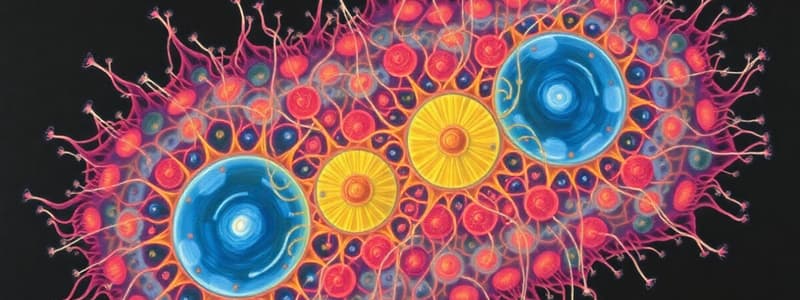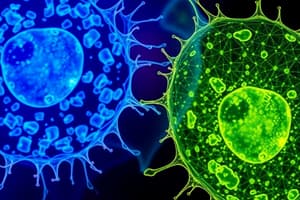Podcast
Questions and Answers
Which of the following is NOT a fundamental concept of biology?
Which of the following is NOT a fundamental concept of biology?
All living organisms are composed of only prokaryotic cells.
All living organisms are composed of only prokaryotic cells.
False
What is the primary genetic material found in most organisms?
What is the primary genetic material found in most organisms?
DNA
Natural selection acts upon the existing __________ within a population.
Natural selection acts upon the existing __________ within a population.
Signup and view all the answers
Match the following biological concepts with their definitions:
Match the following biological concepts with their definitions:
Signup and view all the answers
What defines eukaryotic cells?
What defines eukaryotic cells?
Signup and view all the answers
Ecosystems consist solely of living components.
Ecosystems consist solely of living components.
Signup and view all the answers
What process converts the information in genes into functional molecules?
What process converts the information in genes into functional molecules?
Signup and view all the answers
Study Notes
Biological Systems
- Biology is the scientific study of life, encompassing a vast array of topics from the smallest molecules to the largest ecosystems.
- It's a multidisciplinary field, drawing upon physics, chemistry, and other sciences to understand the complex processes of living organisms.
- Fundamental concepts include cell theory, evolution, genetics, and homeostasis, which are key to understanding various biological phenomena.
Cell Biology
- Cells are the basic units of life. All living organisms are composed of one or more cells.
- Cells exhibit a remarkable degree of organization, with various organelles performing specialized functions.
- Cellular processes include metabolism, reproduction, and response to stimuli.
- Prokaryotic cells (e.g., bacteria) lack a membrane-bound nucleus and other organelles. Eukaryotic cells (e.g., animal and plant cells) possess a nucleus and numerous organelles.
- Cell membranes are selectively permeable, regulating the passage of substances into and out of the cell.
Genetics
- Genetics is the study of heredity and variation in living organisms.
- Genes, segments of DNA, carry the genetic instructions for building and maintaining an organism.
- DNA (deoxyribonucleic acid) is the primary genetic material in most organisms, organized into chromosomes.
- The process of gene expression involves converting the information in genes into functional molecules, such as proteins.
- Mutations in DNA can lead to changes in gene expression, potentially resulting in variations and traits.
Evolution
- Evolution is the change in the heritable characteristics of biological populations over successive generations.
- Natural selection is a key mechanism of evolution. Organisms with traits better suited to their environment are more likely to survive and reproduce.
- Natural selection acts upon the existing genetic variation within a population.
- Speciation is the formation of new and distinct species through the process of evolution.
Ecology
- Ecology is the study of the relationships between living organisms and their environment.
- Key ecological concepts include competition, predation, symbiosis, and nutrient cycles.
- Ecosystems are dynamic systems consisting of interacting biotic (living) and abiotic (non-living) components.
- Biodiversity is the variety of life at all levels, from genes to ecosystems. It is essential for the health and stability of ecosystems.
Human Biology
- Human biology focuses on the structure and function of the human body.
- The human body is composed of organs and organ systems that work together to maintain homeostasis.
- Key organ systems include the circulatory, respiratory, digestive, nervous, and endocrine systems.
- Human health depends on understanding the intricate workings of these systems and their interactions.
- Diseases and disorders can arise from various disruptions in normal biological processes.
Studying That Suits You
Use AI to generate personalized quizzes and flashcards to suit your learning preferences.
Description
Explore the intricate world of biological systems and cell biology through this quiz. Understand the fundamental concepts like cell theory, evolution, and the organization of cells. Perfect for anyone interested in the science of life and the mechanisms that sustain it.




